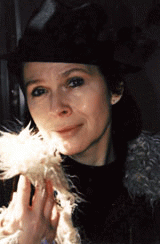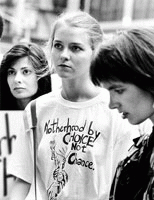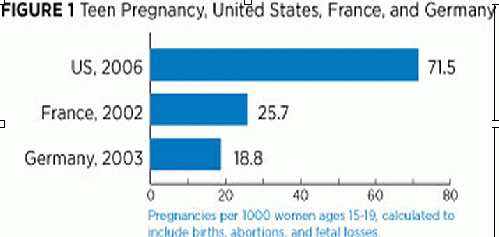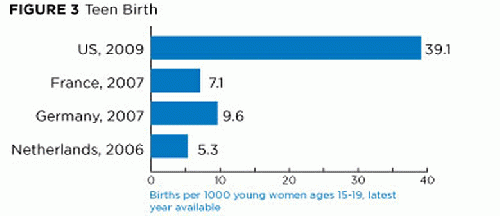My guest is award-winning documentary filmmaker Dorothy Fadiman. Welcome back to OpEdNews, Dorothy. I understand that you've revisited the Abortion Rights Trilogy. Why? What have you accomplished this time around?
The three films in the Abortion Rights Trilogy cover more than a century of women's reproductive history and run for two and a half hours. In today's world of online media, we are all experiencing and wanting more of our news and entertainment in smaller, easily digestible bites. So what I've done is take the most riveting, informative moments from the trilogy, and created cameo vignettes. These are not "excerpts". Rather, each short piece has a beginning, middle and end. Why now? The escalating restrictions on women's rights send out a clarion call for journalists, documentary filmmakers and all of us to stand up and speak out about the erosion of access, services and funding.
Despite all efforts, Roe v. Wade still stands, Dorothy. Aren't you overreacting? What do women have to worry about in this day and age? Aren't our reproductive rights safe? Give us some examples to back up your claims, please.
There is no question that restrictions on abortion rights are escalating nationwide, state by state.
For an overall summary, we can look at the
Guttmacher Institute data. Across the country, in 2011, a record number, more than 1,100 reproductive health and rights-related provisions were introduced. 68% of these new provisions--92 in 24 states---restrict access to abortion services.
To appreciate the nature of these restrictions, let's look at one state's most recent bill enacted into law:
New law in Arizona states 'pregnancy begins two weeks before conception'. This law is not related to access, per se, it is simply another way to limit a woman's right to choose.
As for
restrictions related to the procedure of abortion itself, six states mandate that an abortion provider perform an ultrasound on each woman getting an abortion and that she be provided the opportunity to view the image. Gynecologists and obstetricians across the country agree that this procedure is not medically necessary. The purpose of this restriction, introduced and supported by anti-abortion legislators, is to dissuade a woman from proceeding with termination.
Even more dangerous, many states and federal legislators are working toward a complete ban on abortions. When abortion itself is denied under all circumstances, what is the result? Women die.
WHO reports that more than 45,000 women a year die from unsafe abortions around the world.
Those numbers are only for those cases that have been reported and proven. The actually number is far greater. While even those statistics may seem overwhelming, in order for that information to become "real" let's go to a country where abortion is illegal under all circumstances and see how that works. In August 2012, authorities
refused to allow a pregnant 16 year with leukemia to undergo chemotherapy. There is a strict abortion ban in the Dominican Republic and the treatment was "likely to terminate her pregnancy". She died weeks later. {
MSN coverage]
T-shirt message: Motherhood by Choice, not Chance
photo credit: Bettye Lane
We live in very polarized times. How do you use your craft to move people, especially on such a volatile issue, without making them angry?
For me, the interviews are the bridge between worlds, between points of view.
When I do interviews for any of my films, my goal is to find the highest common denominator in each situation. I listen for what is motivating people, what is frightening them and what gives them hope. One of the reasons abortion is such a volatile issue, is that so few people understand the realities of what a woman deals with when she feels desperate. Rarely have they heard her speak in the first persona. Many people superimpose their own beliefs on this woman's situation, without any real understanding of what she is going through . All of my films, many of which deal with physical challenges, whether someone with AIDS or spinal cord injury treatment or emphysema, I use the interviews to help the viewer not label anything as right or wrong. But rather, when I am doing the interview, I imagine the viewer, and I listen for what others will recognize and to what a viewer might relate.
The personal stories are at the heart of these interviews. In the editing room, I listen for ways to retell these stories so that any woman or man can see him or her self. I've interviewed people who've lost a family member to abortion, doctors who perform abortions and wear bulletproof vests, clinic directors who return to work after multiple arsons, and people who fought to change the law when abortion was illegal. And I always hope the viewer will be able to ask, "Why do these people do what they do?" rather than judge them. Or, why did this person do what he or she did?
A few years ago I interviewed two college age girls whose close friend, Kris, had died from a self-induced abortion. Rather than begin with the tragedy, I asked the young women to start by talking about their friendship with Kris. Then, once they were describing that connection. I asked them to retell the story about what had happened which had led their friend to attempt to abort herself. In sharing their memories, the story came alive. They described how Kris had been to a clinic for an abortion previously, and was profoundly humiliated by a crowd of anti-abortion demonstrators. Kris was emotionally devastated by that experience. When she became pregnant a second time because her birth control failed, she refused to face the people who had shamed her before. Her decision, rather than be accosted by demonstrators, was to abort herself. As her friends talked about this, and I followed their direction in the interview, their bitterness about the situation led to a poignant sadness, a feeling of loss which anyone, no matter what they felt about abortion, could share. Their own sadness was clearly not only in response to the heartbreaking loss of their friend but at the whole situation. The interview allowed them to open up to the full range of their own feelings.
My first challenge when I do any of these interviews, especially with with Kris's friends for example, is to make it "safe" for people to tell their own stories in their own words. I work, inside myself, to suspend judgment, to quiet expectations, to step back and prepare to listen to what each interviewee wants to say. I find out what interviewees want to and, in many cases, need to talk about, then I pick up on that thread and let the interviewee take the lead. The result of giving someone this space is that highly charged subject matter can be shared in an intimate and revealing way, but still not a way that is angering to a viewer. Having an opportunity to hear people tell their own personal stories allows the person listening and watching, no matter what their own position may be, to see themselves in the story and to tap into the common human experience.
So rather than hear and see someone rant or complain about something volatile, the viewer sees someone who cares, talk about their own actual experience. In the editing, I look for and listen for those moments when the interviewee taps into a deeper level of remembering or insight. I try to capture them making connections between ideas or experiences that may have seemed to be separate or even clashing. And so when a viewer watches this, there is a recognition".an invitation to open up to someone else's world.
I hope that the person watching can say "I may not agree with you, but I see your point of view." I let the stories unfold, and as much as possible, tell themselves.
In another situation, I interviewed an abortion provider who was devastated by anti-abortion arsonists setting fire to her clinic. We began this interview with her describing her passion for her work, and why she provides this service. Then her grief following the fires. After that, I invited her to talk about her commitment again...and why she chose to continue after the fires. Her sharing this time, after two hours of interviewing, transcended any bitterness, and she described being back in touch with her commitment to that in which she believes.
Here are her words:
After the fire-bombing in our office, our whole office and my family went through a lot of struggle about whether I should continue. And, for me, it was a combination of making my own decisions about my life. And also having to make them because I am not alone. I have a family. Their emotions and their feeling are very important to me, and my child-- I also do not want him to live in fear. I don't want him to become paranoid. He's a happy person, but yet I wanted him to understand that there are people in our lives that can harm us, and we need to be sensitive to that. And my husband worried a lot. Did not want me to continue, and we had to talk. And he came around, interestingly enough, to the same thing that I did...Which is, if you don't live by what you believe, what are you living for?
Her statement brings us back to what I hope to do with each film, to tap into feelings anyone, no matter what their position, can recognize.
Tell us about your fall screening tour, Dorothy. What do you have planned and is the timing coincidental? The first step in our multi-media project was to create the Choice at Risk online campaign, by selecting the strongest clips from the abortion rights trilogy. Then we created a website
ChoiceatRisk.org . In this way, we can offer the media free, to people around the world. When we realized that "choice" itself was going to be a key issue in the upcoming elections in many states, as well as some federal races, we developed another campaign, ElectionsatRisk.org with clips and a website related to voting issues. None of our material says who to vote for or how to vote. What we emphasize is the importance of learning more about the issues, being aware of possible problems at the polls, and becoming active in addressing the complexities and subtleties of voting. We encourage people not only to vote, but we encourage them to urge other people to vote. Until this spring, both campaigns were still virtual and online only. That has now changed.
We have launched a screening tour in which I will introduce the films and clips, and hold an open discussion after the screenings. I know, from 35 years of filmmaking, that a film comes alive in a much stronger way when I take it on the road, and show it as widely as possible. Each screening sends out concentric circles. We are having our preview screening tour kickoff with two events in Reno, Nevada. Then, a full scale premiere in Philadelphia on September 27 in the First Unitarian Church in a hall that holds 500 people. After that, I'll be off to other cities in PA, including Pittsburgh, various cities in Ohio and a string of events in Florida. Hosts include local affiliates of Planned Parenthood, Unitarian Universalist Congregations, the Philadelphia Women's Center, the National Council of Jewish Women, NOW, and many more.
Some of these events are being held on college campuses in order to reach out to a generation that has no memory of the back alley days. One focus of the events in Nevada is to warn young adults about the potential loss of access and financial support for contraception. The lead line in their invitation to that community is: "Birth control is facing unprecedented attacks..." When I became unintentionally pregnant in 1961, birth control was illegal for unmarried adults. It wasn't until the Supreme Court decision in Baird vs. Eisenstadt in 1972, that contraception was legal, nationwide, for all unmarried adults and teenagers.
These screenings support the work of various pro-choice organizations who are taking on the challenge of fighting restrictions on access and funding cuts for birth control. Not only birth control, but state legislatures are calling for cuts in sex education which mentions birth control. The sad fact is that federal funding for abstinence-only has failed to equip young people with the information needed to make healthy and informed decisions about sex..decisions which prevent unintended pregnancy.
http://www.choiceusa.org/index.php?option=com_content&view=article&id=309 In European countries with comprehensive sex education, including birth control, there are significantly fewer unintended pregnancies and fewer abortions.
Pregnancy The United States'
teen pregnancy rate is almost three times that of Germany and France, and over four times that of the Netherlands.
(Figs. 1 and 2) Birth
The United States' teen birth rate is nearly eight times higher than that of the Netherlands', over five times higher than France's, and over four times higher than Germany's. (Fig. 3) [1,3,4]
In the United States, the teen abortion rate is twice that of Germany and more than 1.5 times that of the Netherlands. (Fig. 4) [1,2,3,17]
Abortion
For me this road trip, is a way to open dialogues about how each of us, in our own way, with our own resources, can work to protect women's reproductive rights. If people want to hold screenings of any of our films or clips, all media is free to download. After September 6th we are offering a detailed online guide as well for how to host a screening, get the word out and more.
Bottom line, while the virtual world is amazing, and rich with possibilities, there is something special about showing films in person. I encourage people, if possible, to hold house parties.
Once again, you bring your passion and delicate touch to a difficult, potentially contentious topic, Dorothy. Thanks so much for talking with me again. It's always a pleasure and an education. Great success with your road tour!
***
all images courtesy of Dorothy Fadiman














